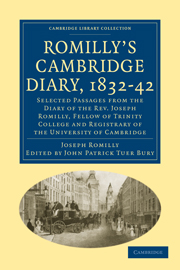 Romilly's Cambridge Diary, 1832–42
Romilly's Cambridge Diary, 1832–42 Introduction
Published online by Cambridge University Press: 05 July 2011
Summary
Bachelor clergymen of the Church of England have been among the most regular and assiduous of diarists, and many readers have delighted in the intimate and artless picture of eighteenth-century rural life painted by Parson Woodforde or in the poetic quality of the impressions of Radnorshire and Herefordshire in the 1870s recorded by Francis Kilvert. These were men whose academic career was merely a stage on the way to a country living and the life of a conscientious, if not over-zealous, parish priest.
In the Diaries of Joseph Romilly (1791–1864) we meet a clergyman of a very different kind, a townsman rather than a countryman, one who spent the whole of his active life in Cambridge as a Fellow of Trinity College and who was for a large part of it an important University official; one, moreover, who, apart from being for a few years the non-resident rector of Porthkerry in Glamorgan, never had a parish and seldom took duty or preached. Yet Joseph Romilly, like Woodforde and Kilvert, was a warm-hearted and sociable person and a devout and conscientious Christian. A cultured and travelled man of means, who by virtue of his position was in touch with or had the opportunity of meeting many of the ablest men of his day, he gave liberally to the poor and to numerous good causes and was a devoted brother, a kind uncle, and a generous master to those in his employ.
- Type
- Chapter
- Information
- Romilly's Cambridge Diary, 1832–42Selected Passages from the Diary of the Rev. Joseph Romilly, Fellow of Trinity College and Registrary of the University of Cambridge, pp. vii - xivPublisher: Cambridge University PressPrint publication year: 2009First published in: 1967


